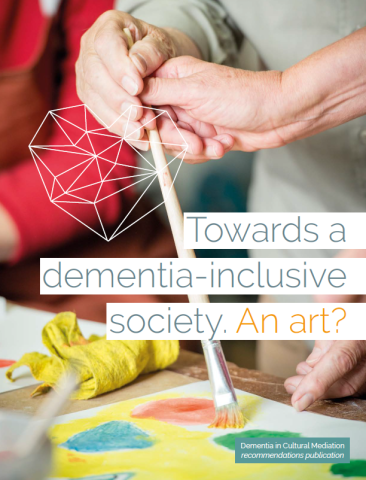
“As an art historian, teacher and art lover, art is an integral part of my life. Dementia doesn’t change the essence of who I am, what I enjoy and what gives meaning to my life. In fact, each person is an artist and creatively shapes his or her life. Art can be healing and helps us to give things a place. Life itself is one process of shaping and sculpting ...”
Kris Mees, former art history teacher and member of the ‘Flemish working group of people with dementia'
As it is very important for the DCUM strategic partnership that as many cultural mediators and end-users as possible will benefit from the website and training material, it is crucial that these tools become well-known and that we reach out proactively. That’s why the third work package of the project focused on the sustainability and use of the project output beyond the project period. This way we want to embed our project results in local and regional initiatives, but we also want to provide answers to future challenges and opportunities in the field of culture, arts and dementia policy at an international level.
The first pillar of the recommendations work package consists of sharing good practices, relevant information and current trends through social media on Facebook, Twitter and YouTube. The second and main part of the recommendations work package was the development of a digital publication to disseminate all the good practices, knowledge and experiences developed during the three years of collaborating in the ‘Dementia in Cultural Mediation’-project, with three clear goals:
• Offering a set of reflections and recommendations about organizing cultural activities for people with dementia and (in)formal caregivers.
• Informing the broader audience about the ‘Dementia in Cultural Mediation’ mission and lessons learned.
• Reaching out to important actors in the field by providing an inspirational guide for building a sustainable offer on culture and dementia within their organization, city or country.
Below you can find an overview of the eight chapters of the recommendations publication 'Towards a dementia-inclusive society. An art?'.
Each chapter is available for download and at the end of the overview you can also download the entire publication and a summary.
This chapter gives a short overview of the project mission, the main output, the goals of this publication and the target groups.
This chapter explores the key facts and figures on dementia and the sense of urgency to make a shift from a one-sided medical approach to non-pharmaceutical interventions from a validation perspective.
This chapter provides an overview of the impact of different cultural activities in the fields of literature, visual arts, dance, theatre and music, based on scientific research and experiences from existing initiatives.
This chapter describes the challenges and opportunities to build a wide and diverse cultural offer tailored to the different needs and capacities of people with dementia on a microlevel, mesolevel and macrolevel.
This chapter gives tips & tricks to involve local residents in building a dementia-inclusive community. Art and cultural activities can play an important role in achieving this.
This chapter navigates through the 'Dementia in Cultural Mediation' online resources and takes a closer look at the transferability of the deliverables beyond the project scope.
This chapter gives guidance on the process of involving end-users as ambassadors to disseminate the project and to reduce the stigma on dementia, as key pillars of the 'Dementia in Cultural Mediation' initiative.
This chapter looks at the impact of the COVID-19 pandemic, both on the project as well as on other social-artistic activities, and concludes with a look into the future.
A summary of the publication 'Towards a dementia-inclusive society. An art?' is available for download in English and the three languages of the project partners.






